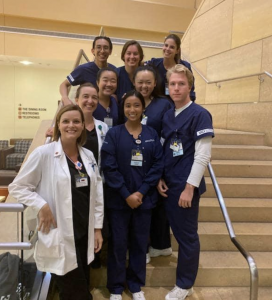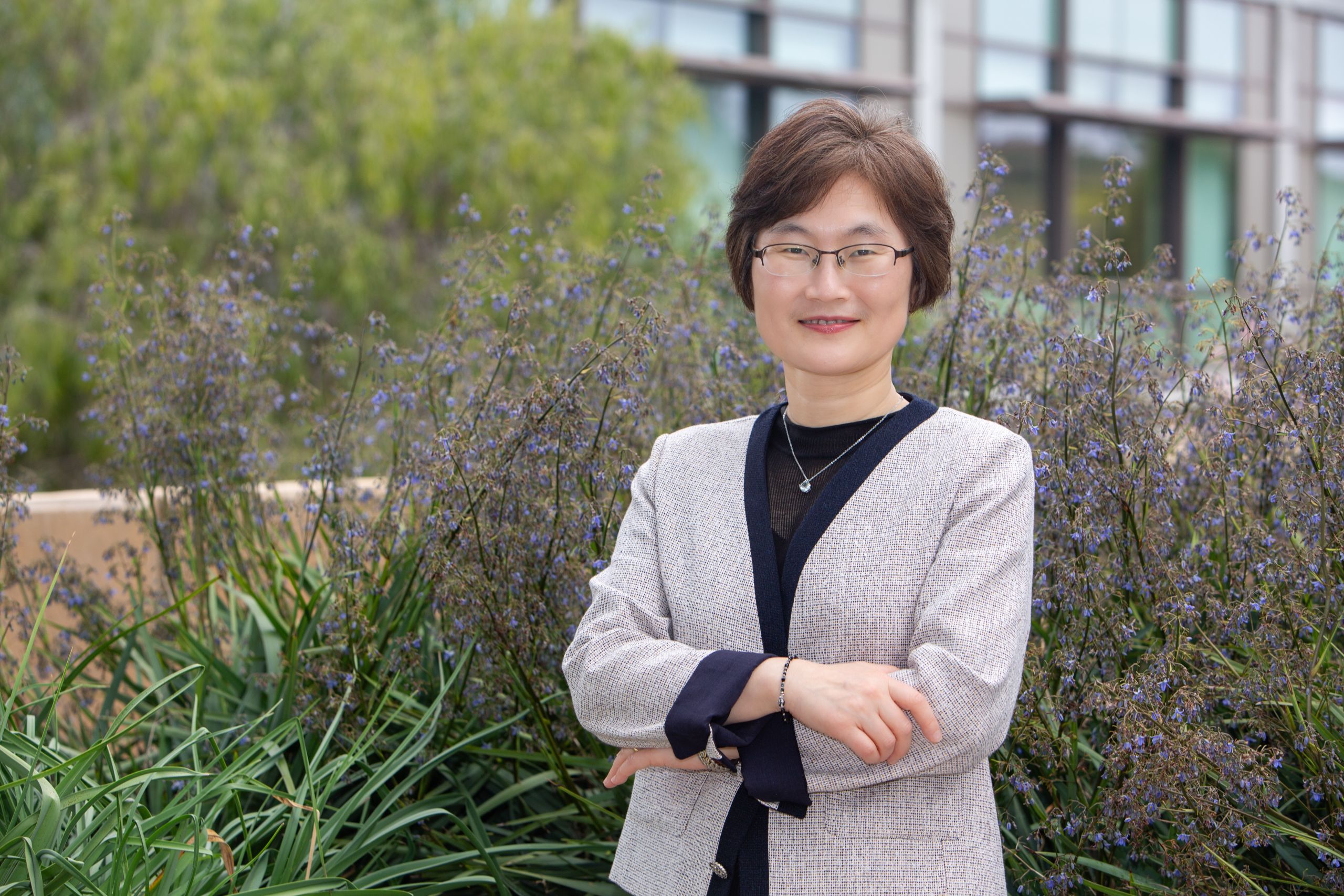
Pre-Licensure Program Director Dr. Leanne Burke, EdD, with some of her nursing students prior to the COVID-19 pandemic.
Everything nurses learn is reinforced in the last quarter of their education.
So what, then, when a global pandemic disrupts the last quarter of classes?
Enter UCI Sue & Bill Gross School of Nursing pre-licensure program director and associate clinical professor Leanne Burke, EdD. Her role is critical: She ensures future nurses meet the requirements to graduate and qualify for their licensing exams.
“Things typically look much different than this,” Burke says of how students meet these requirements.
Ordinarily, nursing students at UCI have 120 hours of direct patient care with a supervising and guiding nurse, known as a preceptor. Before coronavirus, nursing students and their preceptors were able to work at UCI Medical Center.
After coronavirus, however, that became impossible as limits on visitors and staff went into effect.
Changing the curriculum
Dr. Burke had to pivot quickly to find other ways for students to meet the requirements while seeking approval from the California Board of Registered Nursing (BRN), which governs the nursing school curriculum.
“I had to write multiple curriculum changes for our program to respond to the pandemic,” she says.
Since the University moved all in-person courses to remote instruction, a request was made to change the method of instruction for all nursing courses until the end of the state of emergency.
For junior bachelor and first-year masters-entry students, she requested and received a waiver that would allow them to have 50% of their clinical hours completed through virtual simulations and other indirect patient care..
The hope is that they will be able to return to the hospital in the summer to finish their hours in person, she says.
For senior and second-year masters-entry nursing students, Dr. Burke requested the same increase in the percentage of their hours they could spend doing virtual simulations in lieu of patient care as was provided to the juniors.
The remainder of their direct patient care hours are spent working in diverse areas, such as the transfer center, reviewing cases of critical patients at other facilities for transfer to UCI Medical Center.
Students are also participating in community health projects through collaborations with nonprofits, such as the Second Harvest Food Bank of Orange County and Home for Refugees, a nonprofit that assists refugee families.
A passion for education
Dr. Burke has wanted to be a nurse for as long as she can remember. Two of her cousins are nurses. “I loved what they said about their jobs.”
After working as a labor and delivery nurse and obtaining her master’s degree in midwifery at San Diego State University, she started teaching a clinical group at the University of San Diego.
The experience was pivotal.
“I absolutely loved it. I loved teaching nursing students five or six years after I graduated myself,” she remembers.
“It brought me back to my experiences with nursing and all of the emotions in the first and last moments of someone’s life.”
Teaching almost exclusively
Since her graduation from San Diego State, Dr. Burke’s focus is almost exclusively on teaching, whether it’s teaching other nurses, precepting nurses or educating nursing students.
Lacking a foundation in higher education and curriculum development, she pursued her doctorate in nursing education from Southern Connecticut State University. Last November, she defended her dissertation and officially became Dr. Burke.
She’s proud to be educating nurses of the future at UCI.
“I know that everyone who graduated from here has passed muster. I have every confidence in them.”
Devotion to nurses of the future
Dr. Burke doesn’t mind the demands of her job. She loves what she does.
Her drive comes from the desire to see her students succeed at whatever they do.
“I work tirelessly for the students because I love them. I want them to be the best nurses who can offer the best care. And that benefits the patients, too.”




Follow Us!